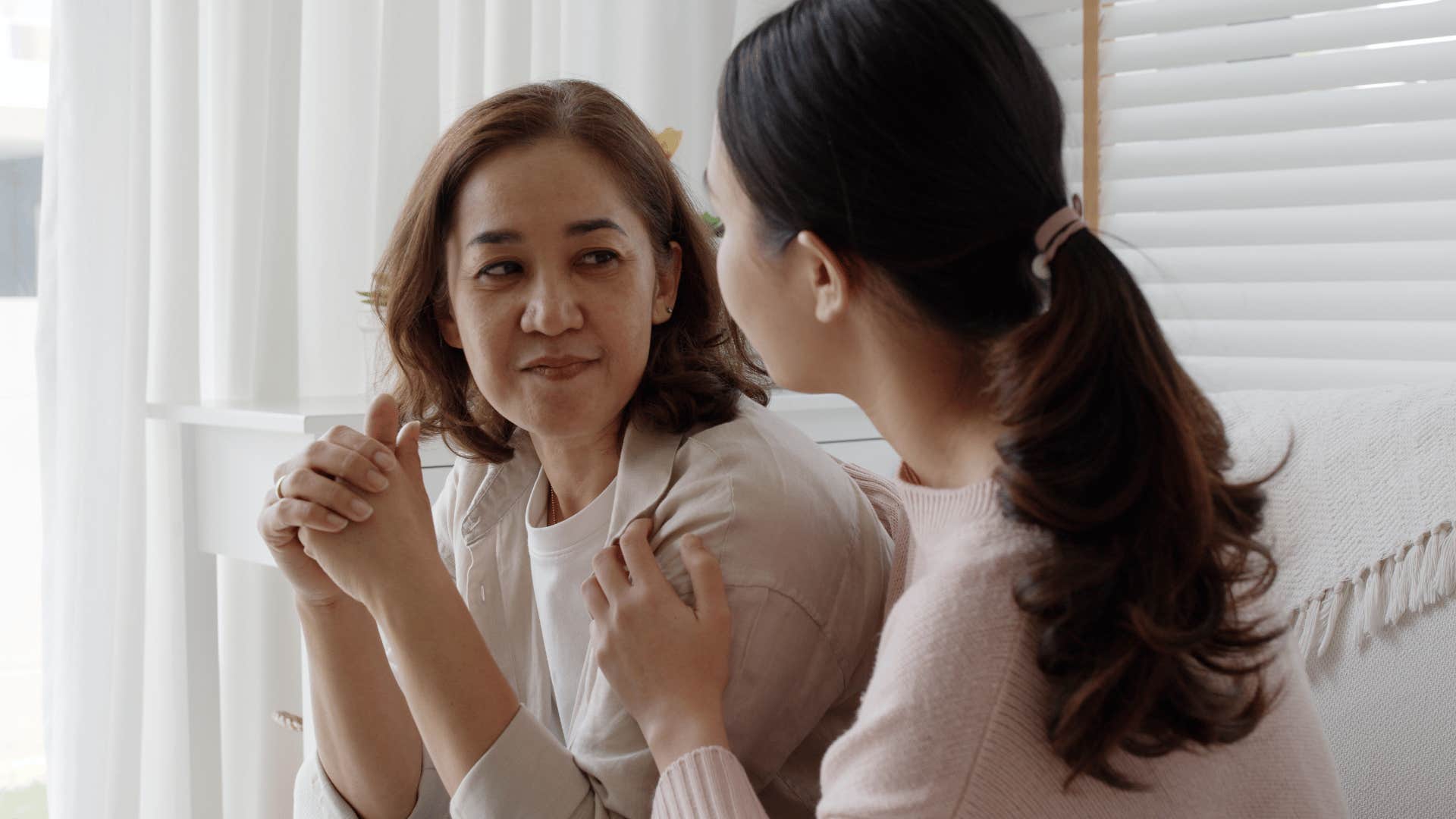11 Phrases Parents Of Adult Children Are Tired Of Hearing
As their adult children embark on their life's journey, parents should remember that they did everything they could to raise their kids right.
 fizkes | Shutterstock
fizkes | Shutterstock Due to complex economic and social reasons, more young adults live with their parents now than in previous generations. A 2022 survey from Pew Research Center found that half of adults between the ages of 18 and 29 were living with one or both of their parents. Despite how common it is for adult children to live with their parents, 36% said that doing so is bad for society, 16% said it's good for society, and 47% said it didn't make a difference.
Yet outside opinions on this major societal shift matter less than how the parents and their adult children, themselves, are able to manage their relationships. The increased closeness often brings up challenges in communication and there are many phrases that parents of adult children are tired of hearing.
Adult children might ask for more than their parents can give or have high expectations that their parents can't meet. Learning how to talk to each other and establish clear boundaries can help parents and their adult children navigate the storms of their changing relationships.
Here are 11 phrases parents of adult children are tired of hearing
1. 'You're so old-fashioned'
 fizkes | Shutterstock
fizkes | Shutterstock
Adult children tend to say this phrase when their parents offer advice that they don't want to listen to. Instead of accepting their parents' years of wisdom, they say, "You're so old-fashioned," which is a fairly dismissive response.
Parents of adult children get tired of hearing this phrase because it discounts their experience. Even if their advice is old-fashioned, there's a lot their kids can learn from them. While some traditions are better off left in the past, other old-fashioned habits should be brought back, because they're still useful today.
2. 'You wouldn't understand'
 fizkes | Shutterstock
fizkes | Shutterstock
Parents of adult children are tired of hearing the phrase, "You wouldn't understand," because it invalidates their life experience. When adult children tell their parents that they don't understand what they're going through, it can make parents feel dismissed and unappreciated.
According to a study from the journal Psychology and Aging, various sources of tension can create schisms between parents and their adult children that affect the quality of their relationship. Researchers looked at both individual tensions and relationship tensions. They defined individual tensions as behaviors that have to do with independence and self-care, including jobs, education, finances, housekeeping, health, and lifestyle. They defined relationship tension according to how adult children and their parents interact, including unsolicited advice, contact frequency, and personality differences.
The study concluded that relationship tensions had a stronger impact in the quality of the relationships than individual tensions, noting that both types of tensions lead to a feeling of ambivalence and less solidarity within the relationship. Researchers pointed to the importance of a high-quality relationship between adult children and their parents, as it can be a valuable source of emotional support for everyone involved.
Parents don't particularly like hearing that they can't be of service to their adult children when it comes to offering guidance, which is why they're tired of hearing this phrase.
3. 'Don't worry so much'
 imtmphoto | Shutterstock
imtmphoto | Shutterstock
Being concerned about their children, even when they've reached adulthood, isn't exactly something parents can turn off at will. An adult child might tell their parents not to worry from a place of care and consideration, yet they should also recognize that their parents' worry is an extension of their love.
While worrying is normal, it's possible for parents to become so overwhelmed with anxiety that it negatively impacts the quality of their life and their relationship with their adult children. Psychologist Nick Wignall noted that emotional intelligence rests on a person's ability to recognize, sit with, and express how they feel.
"Emotionally intelligent people are experts at understanding the mental habits and thought patterns that generate their emotional responses," Wignall explained. "They recognize that their anxiety is the result of their habit of worrying."
"They view their emotions — especially the painful ones — as messengers trying to communicate information," he continued. When parents express worry, it's often an indication of some other underlying feeling. "Because while you can't control how you feel directly, you can control how you choose to think — and then indirectly, change the way you feel," Wignall concluded.
4. 'Why don't you trust me?'
 imtmphoto | Shutterstock
imtmphoto | Shutterstock
This phrase is a common refrain from adult children, used whenever they feel like their parents are challenging their decision-making abilities. Just because their parents question their choices, doesn't mean they don't trust their adult children. Rather, it means they want to understand.
Author Kurtis Pykes shared that earning someone's trust depends on honest and consistent communication, as well as holding yourself accountable for what you said you would do or for what you've done wrong. "When you own your mistakes, you display a high level of self-awareness, which implicitly communicates to others that you have a conscience," he explained.
Pykes touched on just how essential it is to trust each other, even when the act of trusting is hard, concluding, "Our existence as a species is deeply baked in our ability to trust one another. Without it, we don't form connections that allow us to build and improve humanity."
Most parents do trust their adult children. When they ask questions or challenge their adult children's actions, it's usually not due to lack of trust. They just want to be let into their adult children's lives and understand their motives for making certain decisions.
5. 'You never listen'
 fizkes | Shutterstock
fizkes | Shutterstock
This phrase is a common one, especially during moments of conflict. When emotions are running high, it's easy for adult children and parents to talk over each other, and feel like the other person isn't actually listening.
Career and life management consultant Ruth Schimel, PhD shared just how important listening is to building close relationships with others, explaining that "listening helps boost trust and understanding. It promotes learning and opportunities. A foundation for intimacy and closeness, listening can also strengthen most relationships. As passive and simple as it may seem, listening is a powerful skill that benefits from your self-awareness and practice."
Schimel offered guidance on how to listen well, advising people to come to conversations knowing what message they want to share, while considering the interests, needs, and perspective of the other person.
"Your listening is a great, intangible gift to give to others and to yourself. But it takes time, attention, and consistency to excel — especially at first or if you tend initially to be controlling or impatient with the process," she concluded. "Once you improve and apply your listening skills, you'll open windows and doors to new possibilities and richer relationships in most areas of your life."
6. 'You're so critical'
 fizkes | Shutterstock
fizkes | Shutterstock
Most parents work really hard to provide unconditional support and love to their children over the course of their lives, which is one reason why parents of adult children are tired of hearing the phrase, "You're so critical." Sometimes, adult children perceive their parents as being critical without any foundation for that assessment, yet other times, parents really are overly-critical of their kids, even when they've reached adulthood.
Licensed marriage and family therapist Jennifer Twardowski shared techniques on how to manage having a relationship with critical people. She noted, "Most people who are over-critical have issues with themselves. People who are critical use it as a way to project their own insecurities on other people... It could be anxiety, and criticizing other people is used as a coping mechanism in order to manage it. It could also be spurred on by low self-esteem, insecurity, [or] a sense of superiority."
Parents might be critical of their adult children because they were raised in a judgmental household themselves, and they haven't yet broken that cycle. Twardowski recommended setting boundaries and establishing distance if those boundaries are disrespected. She ultimately advised not to take criticism personally, since it says more about them than you. "Remember that it's not you that is causing their negativity. This person is unhappy with themselves, and it's not your job to fix that," she concluded.
7. 'I don't want to talk about it'
 Ground Picture | Shutterstock
Ground Picture | Shutterstock
Parents of adult children are tired of hearing "I don't want to talk about it" whenever they initiate complicated or emotional conversations. Saying this phrase is an abrupt way to shut down communication. It can make parents feel alienated and isolated from their adult children's inner world. The phrase also makes it hard for parents to to feel close to their adult children and understand what's going on in their lives.
You can't force someone to talk about something they don't want to talk about, even if they're your child. All you can really do is make your presence available, and let them know you'll be there, once they're ready.
8. 'I don't have time to call'
 fizkes | Shutterstock
fizkes | Shutterstock
When parents hear this phrase repeatedly, it can make them feel like their adult children don't value them or see their relationship as important. Hearing this phrase often can make parents feel like their relationship is one-sided or imbalanced.
According to a survey from Pew Research Center, most parents are in close contact with their adult children: 73% reported texting with them and 54% reported talking on the phone or video chatting at least a few times a week. Overall, parents view their relationships with their adult children in a positive light: 41% of parents said their relationship was excellent, 36% said it was very good, and 15% said it was good. Only 8% of parents surveyed described their relationship with their adult children as fair or poor.
Establishing boundaries around communication is important, as is having a sense of independence. Yet staying in touch helps parents and adult children feel connected, which supports their overall emotional well-being.
9. 'Stop treating me like a child'
 Monkey Business Images | Shutterstock
Monkey Business Images | Shutterstock
A phrase parents of adult children are tired of hearing is "Stop treating me like a child" when their parents are expressing care or concern. Adult children say this phrase as a way to assert their autonomy, but it often comes as defensive or ungrateful.
During a discussion on the American Psychology Association's podcast, professor Laurence Steinberg explained the emotional clash that often occurs between parents and their adult children.
"Individuals have a strong need for autonomy, a strong need to, what we say in psychology is to, individuate from their parents," Steinberg said. "And I think that parents often aren't sensitive to this. And when they are frequently giving advice to their young adult children, their children may bristle at it not because of the substance of the advice, and not because there's something that they don't like about their parents, but because the young adult is still trying to establish themself as a competent, capable adult."
Steinberg noted that when adult children don't take their parents' advice, it's often has nothing to do with the parents at all, but rather, "It's about your young adult child's need to establish a sense of autonomy to demonstrate to you and to themselves that they're capable of handling adulthood without having to rely on their parents."
10. 'I need money'
 Chay_Tee | Shutterstock
Chay_Tee | Shutterstock
Finances can be an especially sensitive subject between parents and their adult children. While some parents are willing and able to provide financial assistance to their adult children, others might not have the same means. When adult children ask for money on a consistent basis, it can make parents feel like they only value them for financial support.
Pew Research Center determined that 45% of young adults between the ages of 18 and 34 report being completely financially independent from their parents. Yet even though so many adult children rely on their parents for financial support, 75% say they'll eventually become financially independent from their parents.
A parent's decision to give their adult children money is deeply personal. No matter what they decide, it's important to set clear financial boundaries and maintain open communication about what the financial transaction means to both parents and their adult children.
11. 'It's my life, not yours'
 fizkes | Shutterstock
fizkes | Shutterstock
Parents are tired of hearing their adult children say the phrase "It's my life, not yours," especially when they're giving advice or emotional support. While the meaning behind this phrase is true — an adult child's life is theirs to determine — the tone of the phrase sounds dismissive and harsh.
It can be hard for parents to watch their adult children struggle or make mistakes, but that's part of the learning process. Making the transition to adulthood is never easy. Adult children are bound to make missteps, which can sometimes strain the relationship they have with their parents.
As their adult children embark on their life's journey, it's important for parents to remember that they did everything they could to raise their kids up right.
Alexandra Blogier is a writer on YourTango's news and entertainment team. She covers social issues, pop culture analysis and all things to do with the entertainment industry.

